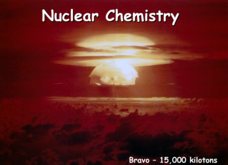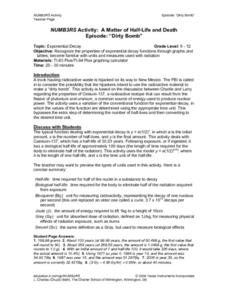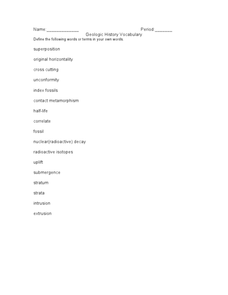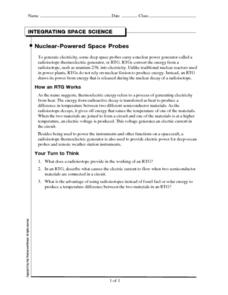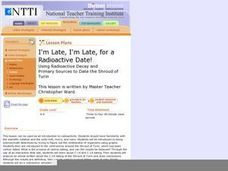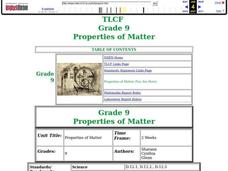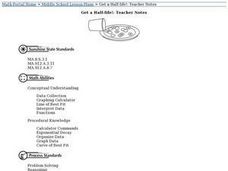Curated OER
Half-Life Problems
In this half-life learning exercise, students calculate the half-life of isotopes, they find masses of isotopes remaining after specified times, and they find particular amounts of time needed to pass for given masses of isotopes to decay.
Curated OER
Half Life Lab
Seventh graders model radioactive decay using pennies, collect data from their model, apply scientific visualization techniques to their data and create animated models explaining the concept of radioactive half-life.
Curated OER
What is the Relationship Between Radioactivity and Radon?
Young scholars examine the relationship between radioactivity and radon. They practice using a geiger counter with different materials. They answer questions to complete the lesson.
Curated OER
What is Radioactivity?
Young scholars use a geiger counter to record changes in the amount of radioactivity produced by different objects. They research articles which mention radiation and discuss them. They work together to complete an activity and worksheet.
Science Geek
Nuclear Chemistry
Which bichemicals wash up on shore? Nucleotides! Presentation covers alpha, beta, and gamma radiation. Includes a comparison of fission versus fusion. Presentation is the second in a five-part series.
Curated OER
Worksheet Two
In this math worksheet, students solve differential equations. Students use similar equations, and analyze ways they differ from one another. Students draw directional fields and sketch solutions. The final three questions are...
Curated OER
Earth's Age: The Dating Game
Students conduct a simulation to determine radioactive decay and half-life. Using pennies, dice or sugar cubes as isotopes placed in shoe boxes simulating rocks, they hold five trials representing 1000 years each to find the theoretical...
Curated OER
Earth System Science
Students investigate the age of the earth by using accepted scientific methods. They conduct research about the use of radioactive dating and there is a simulation activity of the process. Finally, students measure the radioactive decay...
Curated OER
Elements and Compounds
Students explain how radioactive decay occurs. In this physical science lesson plan, students simulate radioactive half-life through an experiment. They graph their data and share their results in class.
Curated OER
NUMB3RS Activity: A Matter of Half-Life and Death
Students investigate exponential decay. Students explore the biological half-life of Cesium-137. Students investigate the Goiania Accident of 1987 which is considered one of the worst incidents in the history of the Atomic Age.
Curated OER
Geological History Vocabulary
In this geological history worksheet, students define 17 terms associated with index fossils, nuclear decay, and radioactive decay.
Curated OER
Radioactivity
In this radioactivity activity, students write the mass number and atomic number for the missing element in the reactions. Students identify the isotope that is more stable and determine the half-life of the isotope. This activity has 10...
Curated OER
Nuclear-Powered Space Probes
In this space probes learning exercise, students read about radioisotope thermoelectric generators and how they work. Then students complete 3 short answer questions.
Pace University
Grades 9-12 Earth Science
How has Earth changed over time? Pupils explore the topic in a differentiated instruction unit on the geological time scale. After a pre-assessment to gauge knowledge, class members divide into groups based on their ability levels and...
Curated OER
I'm Late, I'm Late, for a Radioactive Date!
Through the use of an interactive Web site, students explore C-14 and C-14 dating. Then students analyze an article written about the C-14 dating of the Shroud of Turin and draw conclusions.
Curated OER
M&M Science and Math
A series of math and science activities feature M&M's® as manipulatives to help kids work through equations. The resource includes exercises on finding averages, percent of compositions, moles in chemical reactions, genotypes and...
Curated OER
Working with Half-Life
In this half-life worksheet, students use a given table of half lives, mass, time and amount of original sample to solve for unknowns in nine given half-life problems.
Curated OER
WS 6.7 Effects & Applications of Nuclear Chemistry
In this nuclear chemistry worksheet, students are given the biological effects of nuclear radiation. They are also given a list of uses of nuclear chemistry and Einstein's theory of special relativity to calculate the energy change in...
PhET
Isotopes and Atomic Mass
Some isotopes are unstable, or radioactive, meaning they will decay over time and turn into another isotope or stable element. In the interactive simulation, participants manipulate elements to create isotopes and gather information....
Curated OER
Forms of Exponential Expressions
Your young physicists analyze the forms of four equivalent exponential expressions representing an amount of a radioactive material in a substance. They show how each expression is equivalent to the others and what aspects of the decay...
Curated OER
Properties of Matter
Ninth graders explore the molecular structure of matter and how it can affect the physical characteristics of a specific material. They demonstrate that isotopes of an element have different masses. Students demonstrate that the rates of...
Curated OER
Energy Resources Scavenger Hunt
In this environment worksheet, students complete each of the statements with its correct energy resource. They identify and name various types of plants and rocks. Students also identify and explain how fertilizer works and how it can be...
Curated OER
Get a Half Life!
Eighth graders use M&M's to experiment with data. They use a graphing calculator to determine the best equation for their data; linear, quadratic or exponential. They analyze the data to find the half-life of their M&M's.
Curated OER
Watershed Investigations
Students find maps of the region to show rock formations and soil types and use GIS to compare radon levels. They describe three types of radioactive decay, interpret graphs, and follow steps to develop a nuclear bomb or energy.






